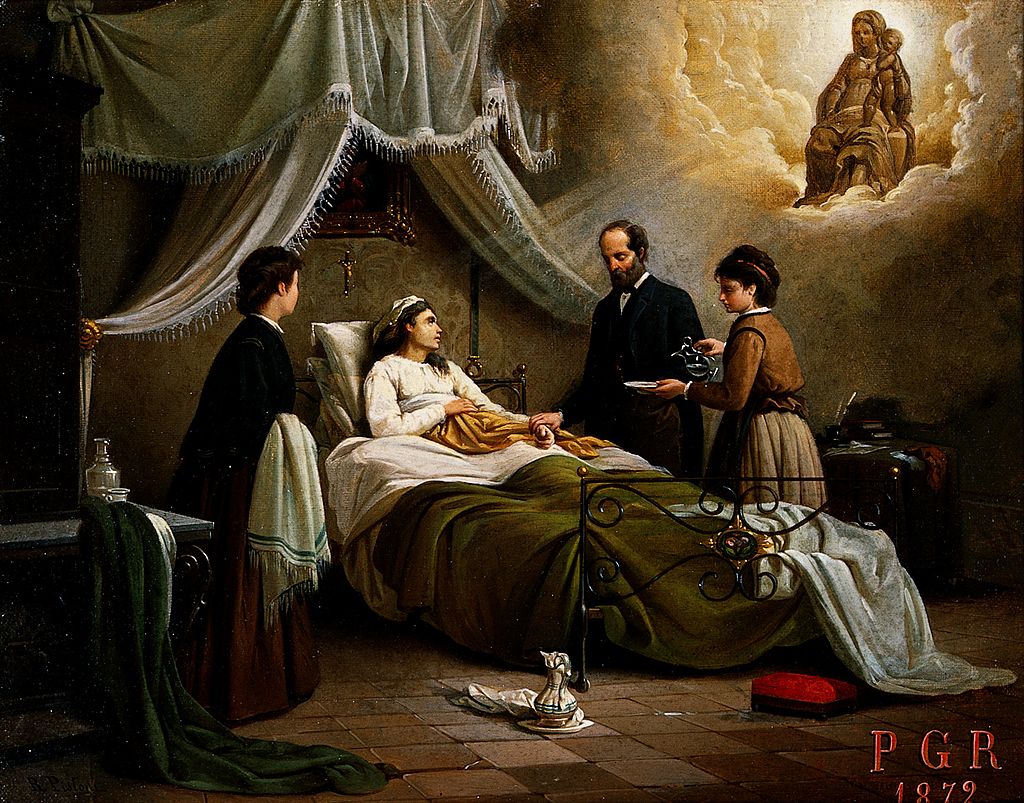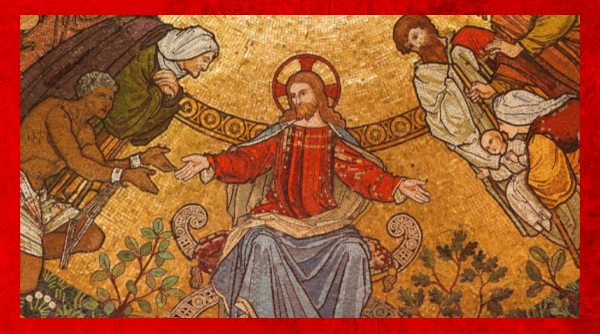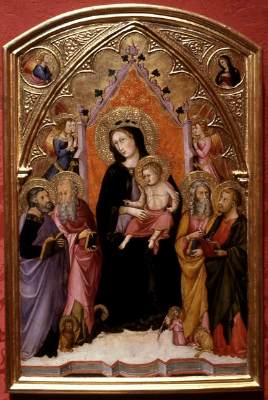Radical Solidarity

(Our Lady Madonna of Childbirth blessing a sick woman)
With the wisdom of the Holy Spirit, our Catholic Church commits the month of October to the beauty of life from conception to natural death and all that lies in between. Commonly known as Respect Life month, championing the dignity and intrinsic value of every human being is what underlies being ‘family’. Families are the foundation of society and the manner in which we were created to live. While we do not choose the family into which we are born, we can choose how we live in that family.
Every family suffers. Sometimes the wounds are inflicted through the brokenness of family members. At other times, external forces like crime, government, the economy, or weather bear down heavily upon the family. And sometimes it is within one’s own biological makeup that brings disease or death.
Our brain learns from our relationships. We begin any relationship with the perspective of ‘me’ and ‘them’. Over time as bonding develops, that bond is actually encoded into our brains as ‘we’. We see ourselves, present and future, as ‘we’ with that person. Within the family, this begins immediately with the child in the womb. Additionally, the child’s cells intermix with the mother’s, and the mother retains some of the cells of each child she carries. So, when the parents suffer the death of a child, whether preborn or in childhood or as an adult, ‘we’ becomes shattered. The brain, continuing to perceive life as ‘we’, subconsciously is seeking the other who is missing. This is why the death of one’s child is the most difficult to overcome.
We as a Catholic people are courageously open to life. Yet we do not anticipate the need to be just as courageously open to death.
The grief from losing a loved one remains with us throughout life. How we grieve, the grieving process, determines how our brains and the faculties of our soul adjust to this. Our brain needs time to develop new neural pathways that do not expect this other person in daily life. At first this change begins by ceasing practical habits such as caring for the young child or advising the adult child. It is formed by new habits and new predictions of the future, envisioning what that future may be. At the same time, the parent’s heart and mind struggles with the loss of that for which it was created: knowing and loving their own child. Even without this child (and even if they have no other children) they remain a father and a mother. They must learn to identify, understand, and accept their feelings and emotions. Over time, their relationship with these feelings will change and, with it, their experience of grief.
It is a difficult process. At first, fond memories become bittersweet, tainted by the pain of grief. The love that bore those memories remains, but can be inaccessible through the myriad of emotions that pour out. Anger, fear, and hopelessness can consume a grieving parent’s conscious thoughts. The bitterness from holding a grudge against the spouse, others involved in the situation, and even against God becomes the barrier to the true love and delight held in the fullness of memories.

We trust by faith, however, that the deceased child isn’t truly missing in this ‘we’ bond. Rather, it is the manner in which parents live out ‘we’ that has changed, as the child has now gone to God. The Sacraments are the buoys in the ocean of grief. Through the sacramental marriage bond, parents have a storehouse of grace to protect and strengthen their marriage as they muddle through the day with confused hearts. In the Mass, where Heaven and Earth meet upon the altar, parents can offer themselves to God in union with the Precious Blood of our Lord Jesus.
“St. John Paul II first defined “radical solidarity” in this way: ‘In firmly rejecting ‘pro-choice’ it is necessary to become courageously ‘pro woman,’ promoting a choice that is truly in favor of women. … The only honest stance, in these cases, is that of radical solidarity with the woman. It is not right to leave her alone.’” (Bishop Michael Burbidge, Living Radical Solidarity)
We are called to a “new mindset”, a radical transformation of heart that entails “moving beyond the status quo and out of our comfort zones.” When Martha suffered the death of her brother Lazarus, rather than avoiding Jesus she rushed to bring her pain to Him. Jesus did not attempt to give her an answer to her grief. Instead, He was simply present to her. We too are called in this radical solidarity to help grieving parents suffer this inexplicable cross. Jesus is the resurrection and the life for everyone, including the deceased child.
Sadly, 80% of marriages end up in divorce within five years of a child loss. Men and women grieve very differently from one another, misperceiving each other’s behaviors and intentions. Don’t become one of the silent sufferers, part of the 95% of parents who do not seek support after the loss of a child. And don’t be afraid to accompany others as well. Openness to life, and death, is fundamental to being ‘family’.
Tucked away in the middle of this month is a special day in America for parents to join together in grieving. National Pregnancy and Infant Loss Awareness day is held on October 15. It is a day of healing for parents who have lost their child during pregnancy, birth or in infancy. If you have lost a child, permit yourself time with your Lord on this special day. For those who have not lost a child, reach out to someone who has and let them know you are willing to listen when they need to talk. Encourage them to find support such as Red Bird Ministries, approved by the United States Conference of Catholic Bishops to support parents of child loss. Finally, let us all pray for those who grieve the loss of their child, especially our brothers and sisters in the body of Christ.
Then I saw a new heaven and a new earth. The former heaven and the former earth had passed away, and the sea was no more. I also saw the holy city, a new Jerusalem, coming down out of heaven from God, prepared as a bride adorned for her husband. I heard a loud voice from the throne saying, “Behold, God’s dwelling is with the human race. He will dwell with them and they will be his people and God himself will always be with them as their God. He will wipe every tear from their eyes, and there shall be no more death or mourning, wailing or pain, for the old order has passed away.” (Revelation 21:1-4)
ADMG 😊
(Images: Woman in bed by R. Pistoni; Madonna of Childbirth by Trevor Fisher of art by Jacopo Sansovino, both from Wikimedia)

Thank you for caring and sharing appropriately...
Consecrated to the Sacred Heart of Jesus through the Immaculate Heart of Mary. Except where noted, all design, writing and images ©2024 by Debra Black and TheFaceofGraceProject.com. All Rights Reserved. No part of this website may be reproduced, distributed or transmitted in any form or by any means, including downloading, photocopying, recording, or other electronic or mechanical methods, without the prior written permission of the publisher, except in the case of brief quotations embodied in critical reviews and certain other noncommercial uses permitted by copyright law. For permission or to report violations please email: thefaceofgraceproject@gmail.com
